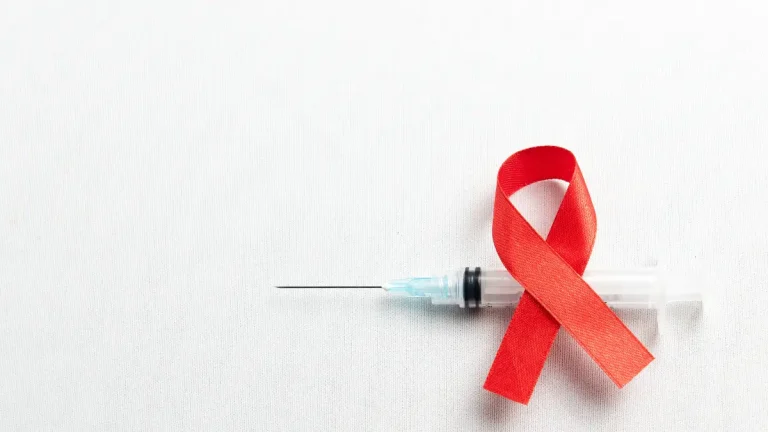Deputy President Paul Mashatile has called for urgent intervention to close South Africa’s HIV treatment gap, warning that millions remain outside the formal healthcare system despite decades of progress. Speaking at the official opening of the 12th South African AIDS Conference in Gauteng, Mashatile insisted that the fight against HIV will only be won if treatment and support reach everyone.
Thank you for reading this post, don't forget to subscribe!ALSO READ: MEC Nkomo-Ralehoko: Early Antenatal Care Key to Preventing Complications
“We Cannot Afford to Leave Anyone Behind”
Mashatile, who also chairs the South African National AIDS Council (SANAC), reminded delegates that all South Africans living with HIV have the right to treatment, support, and dignity.
“We cannot afford to leave anyone behind,” he said. “Every person living with HIV deserves treatment, support, and dignity.”
He used the platform to spotlight the “Close the Gap, Start and Stay on HIV Treatment” campaign, launched in February 2025 at Chris Hani Baragwanath Academic Hospital. The initiative targets 1.1 million people who are not on antiretroviral therapy (ART) — including those who stopped treatment and those who never started.
The Treatment Gap: Progress and Setbacks
South Africa has made significant strides in its HIV response. 96% of people living with HIV know their status, and 97% of those on treatment have achieved viral suppression. Yet only 78% of diagnosed individuals remain on sustained treatment — leaving a dangerous gap that continues to drive illness, death, and new infections.
“This is not just a statistic — it’s a call to action,” Mashatile said. “We need to do more to ensure that those who are diagnosed are not lost in the system.”
Millions of South Africans, particularly in poor or rural areas, still struggle to access consistent care. For them, falling out of the system isn’t just a health risk — it threatens their families and entire communities.
Gauteng’s Progress
Mashatile praised Gauteng for some encouraging results. By August 2025, 153,124 people had re-engaged in care and either started or restarted ART, reaching 47% of the provincial target of 325,848.
Progress differed across districts:
- West Rand: 71% of target met
- Sedibeng: 68%
- Tshwane: 56%
- Ekurhuleni: 52%
- Johannesburg: 35% — the lowest despite having the largest HIV-positive population
The uneven progress highlights the urgency of scaling up efforts, especially in Johannesburg, where thousands remain outside the system.
Community-Led Healthcare: The Way Forward
Mashatile urged the country to shift from clinic-based, top-down models to community-led responses.
“We need to empower communities to lead the response. Healthcare must be accessible, friendly, and stigma-free,” he said.
Civil society organisations at the conference echoed the call, warning that stigma, discrimination, and overcrowded facilities still push too many patients away from treatment.
Expanding the Fight Against HIV
The Deputy President also linked the HIV response to broader public health priorities. He pointed to the End TB Campaign, which aims to screen five million people in the 2025/26 financial year. Both HIV and TB are central to the National Strategic Plan for HIV, TB, and STIs, which sets ambitious targets for reducing deaths and improving health outcomes.
“Let us never forget that behind every number is a life. Our response should be guided by humanity,” Mashatile reminded delegates.
Why This Matters for Gauteng
For Gauteng — South Africa’s most populous and economically vital province — closing the treatment gap goes beyond healthcare. It’s about ensuring stronger communities, healthier families, and a more resilient workforce.
Schools, workplaces, and households across Johannesburg, Tshwane, Sedibeng, Ekurhuleni, and the West Rand still carry the burden when individuals drop out of care.
“HIV is not just a medical condition; it’s social and economic,” said a Gauteng-based health activist. “When patients fall through the cracks, entire families and communities suffer.”
The Way Forward
Mashatile’s speech served as both a warning and a roadmap. South Africa must:
- Strengthen community-based HIV care to reach those outside formal systems
- Hold districts accountable, so lagging regions like Johannesburg can catch up
- Integrate services for HIV, TB, STIs, and mental health
- Fight stigma and discrimination through education and grassroots activism
- Support patients to stay on treatment, not just start it
Building a More Inclusive Healthcare System
Mashatile’s rallying call stretched beyond HIV. He pressed for a stigma-free, inclusive, and patient-centred healthcare system that responds to the needs of South Africa’s diverse communities.
“Behind every figure is a human being,” he said. “Our response should be guided by compassion, dignity, and equity.”
Last Word: A Call for Collective Action
South Africa cannot defeat HIV through the government alone. Civil society, healthcare workers, communities, and ordinary citizens all have roles to play.
The challenge is clear: support community-driven initiatives, encourage loved ones to test and stay on treatment, and challenge stigma wherever it appears. Every life matters — and together, we can close the gap.




